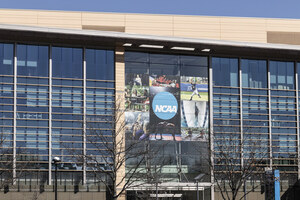 Under California labor law, every person has the right to control the commercial exploitation of his or her identity. This applies to athletes, movie stars, child stars and swimsuit models. This has now been extended to include NCAA student athletes under the California Fair Pay for Play Act and Section 3344 of the California Civil Code.
Under California labor law, every person has the right to control the commercial exploitation of his or her identity. This applies to athletes, movie stars, child stars and swimsuit models. This has now been extended to include NCAA student athletes under the California Fair Pay for Play Act and Section 3344 of the California Civil Code.Choh and Kirk gave up their right to litigate their NIL claims after having been assured that their agreement would not compromise their right to pursue a federal antitrust lawsuit arising from the same set of facts. That’s where the real fireworks and the potential for groundbreaking law will be in Choh v. Brown University.
Same set of facts – three ways to understand
At its heart, Choh and Kirk’s lawsuit is about the fact that they (and similarly situated students) were not offered athletic scholarships. These facts can be seen through a variety of different lenses:
- “Pay college athletes for their billion-dollar work!” shouts a recent Washington Post editorial. First, the facts can be understood as an employer/employee relationship. Workers do valuable work but don’t get paid. In California, this could constitute a violation of California wage and hour laws if the students are seen as employees and the colleges as employers. It looks like wage theft.
- Second, these facts might support a violation of privacy rights if, for instance the athlete’s name or image is used to sell tickets or seek alumni donations without that athlete’s permission. These NIL lawsuits fall within the emerging field of privacy law.
- Third, these facts can be understood through the lens of antitrust laws, which are generally designed to protect consumers from unfair business practices. Think about the athletes as consumers of education and the schools as big businesses, which are overcharging them based on an anticompetitive agreement among themselves.
NCAA Division I sports are big business
Collegiate sports are big business, especially among the roughly 350 colleges and universities in Division I. The NCAA brings in roughly $1 billion annually from sources that include the sale of television rights for its annual March Madness championship basketball tournament. All told, NCAA Division I schools and conferences, through their own media deals, sponsorship arrangements, ticket sales, and other means, have generated nearly $20 billion in revenue related to athletic competitions.
This money is then re-distributed to the schools. In 2022, for example, the NCAA distributed $625 million to Division I schools, which include the defendants in this lawsuit: Brown, Harvard, Yale, Princeton and others among the already well-endowed “Ivy League” schools.
Nonetheless, according to the Complaint, an agreement among these schools (the “Ivy League Agreement”) not to allow or distribute athletic scholarships or compensate athletes for their performances, is a way to keep tuition high for student-athletes. The Council of Presidents, the Ivy League's governing body, enforces the agreement.
Choh and Kirk hope to represent more than 10,000 Ivy League student-athletes.
The Sherman Act bans price-fixing
The Sherman Act is the federal antitrust law that prohibits unreasonable restraints of trade, and is enforced by the Department of Justice. Briefly, the text of Section 1 of the law reads:
“Every contract, combination in the form of trust or otherwise, or conspiracy, in restraint of trade or commerce among the several States, or with foreign nations, is declared to be illegal.”
READ MORE CALIFORNIA LABOR LAW LEGAL NEWS
- the defendants acted contrary to their individual economic interests (e.g., could Brown University otherwise outbid Yale for a particularly talented player);
- the defendants had meetings or conversations, i.e., opportunities to agree (the Presidents’ Council appears to have had these opportunities;
- the defendants had a motive to collude (lowering the cost of talented players as part of maximizing gain);
- the defendants engaged in abrupt or unprecedented changes in behavior (the Ivy League Agreement seems to have come into being in 1945 – not recent except perhaps in the long history of Ivy League schools); and
- the industry is concentrated with few competitors (The Ivy League is a finite group of schools. The eight participating colleges are Brown University, Columbia University, Cornell University, Dartmouth College, Harvard University, University of Pennsylvania, Princeton University, and Yale University.)
